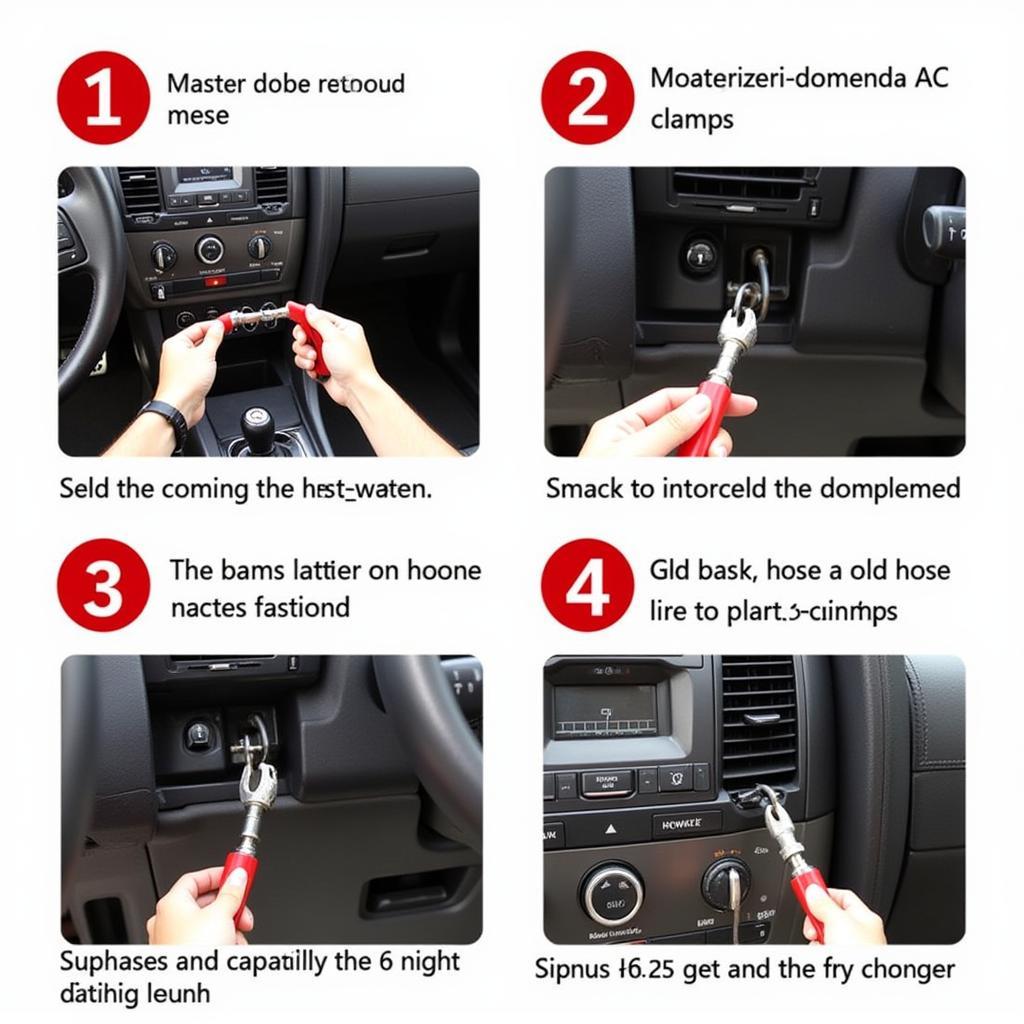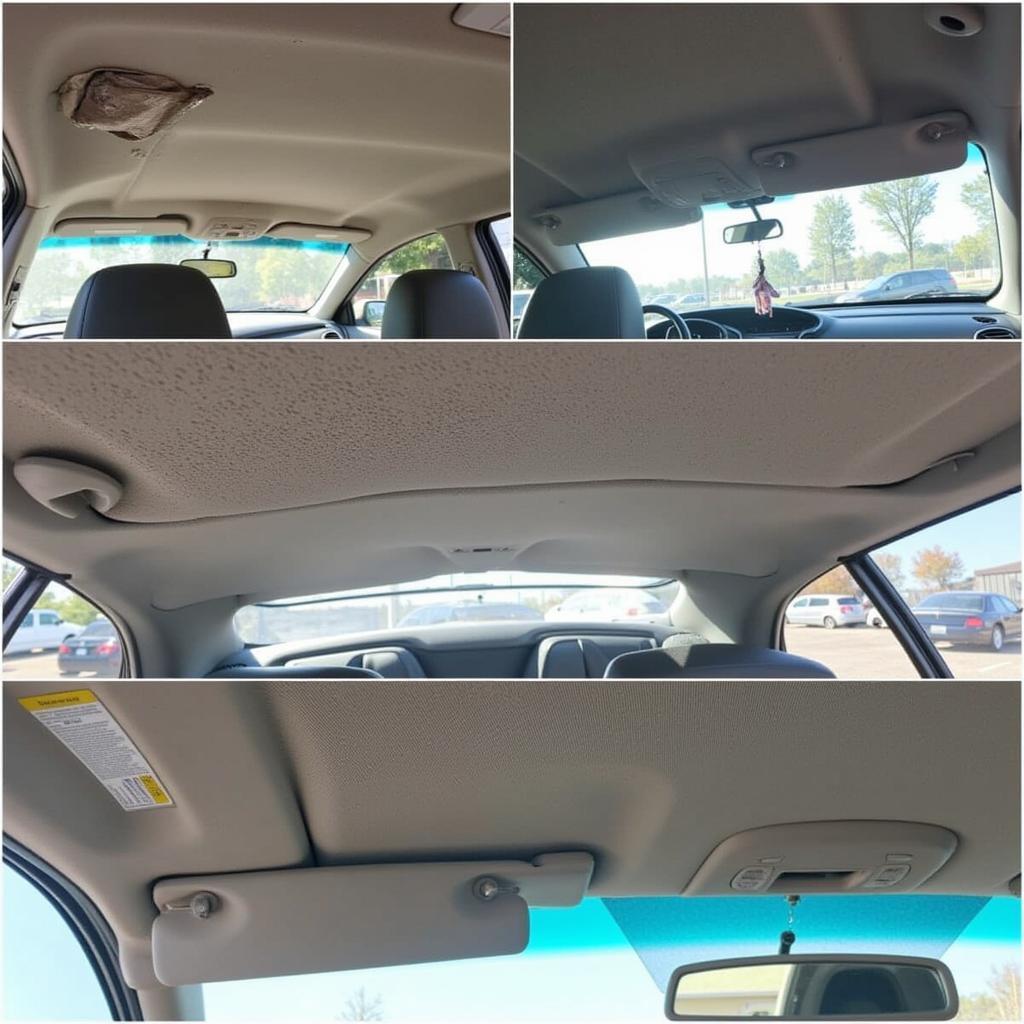One of the most common reasons your car AC might not be working correctly is a leak in the AC hose. This can be a frustrating problem, especially during hot summer. Identifying and fixing a car AC hose leak can save you money and keep you cool on the road. This comprehensive guide will walk you through the process of diagnosing, repairing, and preventing car AC hose leaks.
Understanding Your Car’s AC System and Hose Leaks
Your car’s AC system relies on a network of components, including the AC hose, to circulate refrigerant and cool the cabin. The AC hose, typically made of rubber or metal, carries refrigerant under pressure between these components:
- Compressor: Pressurizes and circulates the refrigerant.
- Condenser: Cools the refrigerant by releasing heat.
- Evaporator: Evaporates the refrigerant to absorb heat from the cabin air.
- Receiver/Dryer: Stores and filters the refrigerant.
A leak in the AC hose disrupts this process, leading to reduced cooling efficiency or complete AC failure. Several factors can cause AC hose leaks, including:
- Wear and Tear: Over time, the rubber hoses can deteriorate due to heat, vibration, and exposure to oil and other contaminants.
- Corrosion: Metal hoses can corrode from the inside out due to moisture and contaminants in the refrigerant.
- Improper Installation: If the AC hose was not installed correctly, it can lead to leaks at the connection points.
- Physical Damage: Road debris, accidents, or even improper handling during maintenance can cause damage to the hose.
Identifying a Car AC Hose Leak
 Car AC Hose Leak Symptoms
Car AC Hose Leak Symptoms
Recognizing the signs of a leaking AC hose is crucial for early detection and repair. Here are some common symptoms to look out for:
- Weak Airflow: A leak in the AC hose can reduce the amount of refrigerant circulating in the system, leading to weak airflow from the vents.
- Warm Air from Vents: If your AC blows warm air instead of cold, it could be a sign of a refrigerant leak, potentially from the AC hose.
- Hissing Sounds: Listen for any hissing or whistling sounds coming from the engine bay while the AC is running, which might indicate a refrigerant leak.
- Visible Signs of Leakage: Inspect the AC hoses and connections for any visible signs of oil residue, stains, or wet spots, indicating a potential leak.
- AC System Not Engaging: In some cases, a severe leak can prevent the AC system from engaging at all.
Fixing a Leaky Car AC Hose
Repairing a leaky AC hose typically involves these steps:
-
Gathering the Necessary Tools and Materials: You’ll need a replacement AC hose compatible with your car model, AC refrigerant, hose clamps, a refrigerant leak detector, safety glasses, and gloves.
-
Discharging the AC System: Before working on the AC system, it’s crucial to discharge the refrigerant safely. This step is best left to a certified mechanic as it involves specialized equipment and knowledge of proper refrigerant handling procedures.
-
Locating and Removing the Leaky Hose: Carefully inspect the AC hoses, starting from the compressor and following the lines to the condenser, evaporator, and receiver/dryer. Look for signs of leaks mentioned earlier. Once you’ve identified the damaged hose, use a wrench to loosen the clamps and disconnect it from the connecting components.
 Replacing Car AC Hose
Replacing Car AC Hose
-
Installing the New AC Hose: Compare the old hose with the new one to ensure a proper fit. Install the new hose, routing it correctly and connecting it to the corresponding components. Secure the hose clamps tightly to prevent leaks.
-
Adding Refrigerant and Testing the System: Once the new hose is installed, the AC system needs to be recharged with the correct type and amount of refrigerant. This step is also best left to a professional as it involves specialized equipment and knowledge of safe refrigerant handling. After recharging, the system should be tested for leaks and proper operation.
“It’s crucial to use the correct type of refrigerant specified for your car model. Using the wrong refrigerant can damage the AC system and pose environmental risks.” – John Miller, Senior Automotive Technician at Autotippro
Preventing Future Leaks
While some wear and tear are inevitable, you can take steps to prevent premature AC hose leaks and prolong the life of your AC system.
- Regular Inspections: Visually inspect your AC hoses and connections at least twice a year or during routine maintenance checks for signs of wear, cracks, or leaks.
- Timely Repairs: Address any signs of leakage or AC system malfunction promptly to prevent further damage and costly repairs.
- Professional Servicing: Have your AC system serviced by a qualified mechanic every 2-3 years or as recommended by your car manufacturer. They can check for leaks, recharge the refrigerant, and replace worn-out components.
- Protecting the Hoses: Consider using protective sleeves or covers on exposed AC hoses to shield them from road debris, extreme temperatures, and other potential hazards.
Cost to Fix Leaking AC Hose Car
The cost to fix a leaking AC hose can vary depending on factors like your car model, labor costs in your area, and the severity of the leak. Generally, you can expect to pay between $150 to $400 for parts and labor.
“Remember, addressing AC issues early can save you money in the long run by preventing more extensive damage to your AC system.” – John Miller, Senior Automotive Technician at Autotippro
For more detailed information on the cost breakdown and factors influencing the price, check out our dedicated article on [cost to fix leaking ac hose car](https://autotippro.com/cost-to fix-leaking-ac-hose-car/).
Conclusion
A leaking AC hose can significantly impact your driving comfort, especially during hot weather. By understanding the causes, symptoms, and repair process, you can address this issue effectively. Regularly inspecting your AC system, performing timely maintenance, and seeking professional help when needed can help keep your car cool and comfortable for years to come.
If you’re experiencing issues with your car’s AC system or suspect a leaking AC hose, don’t hesitate to contact the experts at AutoTipPro. Our team of certified technicians can diagnose and repair your AC system efficiently, ensuring a comfortable driving experience. You can reach us at +1 (641) 206-8880 or visit our office at 500 N St Mary’s St, San Antonio, TX 78205, United States.
FAQs about Car AC Hose Leaks
1. Can I drive with a leaking AC hose?
While driving with a leaking AC hose might seem possible initially, it’s not recommended. The leaking refrigerant can damage other engine components, and driving without AC in extreme heat can be dangerous.
2. How long does it take to fix a leaking AC hose?
The repair time can vary depending on the severity of the leak and the accessibility of the hose. On average, it can take anywhere from 1 to 3 hours to replace a leaking AC hose.
3. Can I fix a leaking AC hose myself?
Fixing a leaking AC hose requires some mechanical skills and knowledge of car AC systems. If you’re comfortable working on your car and have the necessary tools, you might be able to tackle the repair yourself. However, it’s often recommended to seek professional help for a safe and effective repair.
4. How often should I recharge my car AC?
While there’s no set timeframe for recharging your car AC, it’s a good idea to have it checked every 2-3 years or as recommended by your car manufacturer.
5. Can I use a sealant to fix a leaking AC hose?
While some AC leak sealants are available in the market, they are often considered a temporary fix and not a long-term solution.
6. How can I prevent my car AC hose from leaking?
Regular inspections, timely repairs, professional servicing, and protecting the hoses from external damage are effective ways to prevent AC hose leaks.
7. Can a leaking AC hose affect my car’s engine?
Yes, a leaking AC hose can indirectly affect your car’s engine. The refrigerant, if leaked onto engine components, can cause damage over time. Additionally, driving without AC for extended periods, especially in hot weather, can put extra strain on the engine cooling system.





Leave a Reply